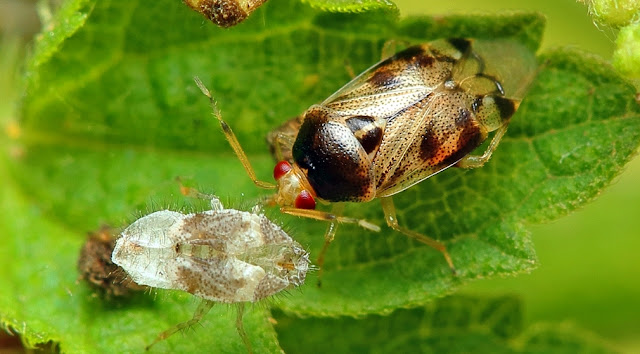And so, where to begin? There is so much going on right now that it's difficult to decide on a pecking order. How about starting with the definition of bizarre?
The Oxford English Dictionary says this:
ADJECTIVE: Very strange or unusual.
Well, that's one definition; here, in picture form, is my own...
You've probably already worked out that these are not rare insects, by virtue of my finding two on one particular day. But I wouldn't mind betting that you've never seen one? You have? Damn! I really shouldn't gamble. You'll know then that these are nymphs of 'Eurhadina' species Leafhoppers.
According to the excellent British Bugs website, they are "Widespread and common on oak everywhere except the extreme north of Scoland." (Apologies Tristan B. But you do need to sort out that typo sometime soon.)
More strange hoppers? Certainly...
Interestingly, Tristan Bantock of British Bugs photographed one for his website the very same month as I did in 2009, and it was here in Kent too. Both his and my own photographs are HERE if you wanted to take a look, not right now though eh?
Hello! Hello! HELLO!!!
Yet more hoppers? Yes Siree Bob! (I do like a good idiom) and as we Brits are apt to proclaim: "I'm sure we can do this. In for a penny, in for a pound." Yes, I know that's more of a proverb; it was the previous...oh never mind. Let's crack on.
This green fella (or missy) is 'Cicadella viridis'. It is a female actually, because it's the females who are green (stop it!). Males are bla.....'of colour-ish', well, gotta stay woke don't ya?
Just before we move on from hoppers; this last image (above) has reminded me that I have a rather exciting little story to share that comes from a friend in Canada. More of that soon, but for now, here's what the TV guys call a teaser...
Next up then is what's described as: A small predatory bug found commonly on a wide variety of plants across southern Britain, but favouring deciduous trees, particularly oak.
Well, it's actually a tiny nymph of that species...
How can I be sure that this is the nymph of that particular species? Well because, this is the adult insect that emerged from the last moult...
I guess I should tell you the species then, eh? It is 'Deraeocoris lutescens', a bug in the Miridae family.
---------------------------------------------------------
A similar story to this next creature: I found a tiny pupa of...something, in the garden...

I had an inkling (well, you can't beat a good inkle!) that it could be Lepidopteran, but beyond that, no clue. And so I kept it safe until whatever it was emerged.
You'd like to see what emerged right? Of course you would...
It's a Diamondback! Sounds like it ought to be a snake really? Anyway, it is just a tiny moth. Tiny it may be, but it's known for its fecundity (well aren't we all?) and interestingly the host plants are all brassicas it seems. None of which I have in the garden this year. At least, I didn't when I found this.
I also had this rather nice moth in the garden. I haven't settled on a definitive identity yet, but I am tentatively going for Orange Swift...
Back to the story I alluded to earlier then. I have Cathy Rowcliffe to thank for this. Cathy lives in Burlington Ontario, and shared her fabulous video of a Cicada eclosing (emerging from its pupa) in her yard . We don't have Cicadas here in the UK: unless you count the New Forest Cicada, last heard of in 2000, and so it was a real treat to see this footage...
Brilliant Cathy, thanks so much for allowing me to share on the blog. I have no idea which species this will be, but keeping in mind that the Cicada life-cycle can be anything from one to seventeen years, you are not going to witness this event too often.
I just love this little part where those big bug-eyes appear...
And the beauty of these totally fresh wings...
I guess I shouldn't make this update too much longer; you all have things to do, places to go, people to see. How about I share a couple of photos from an early morning photo shoot, when I was lucky enough to find a White-legged Damselfly covered in dew...
 |
------------------------------


















1 comment:
.
Post a Comment